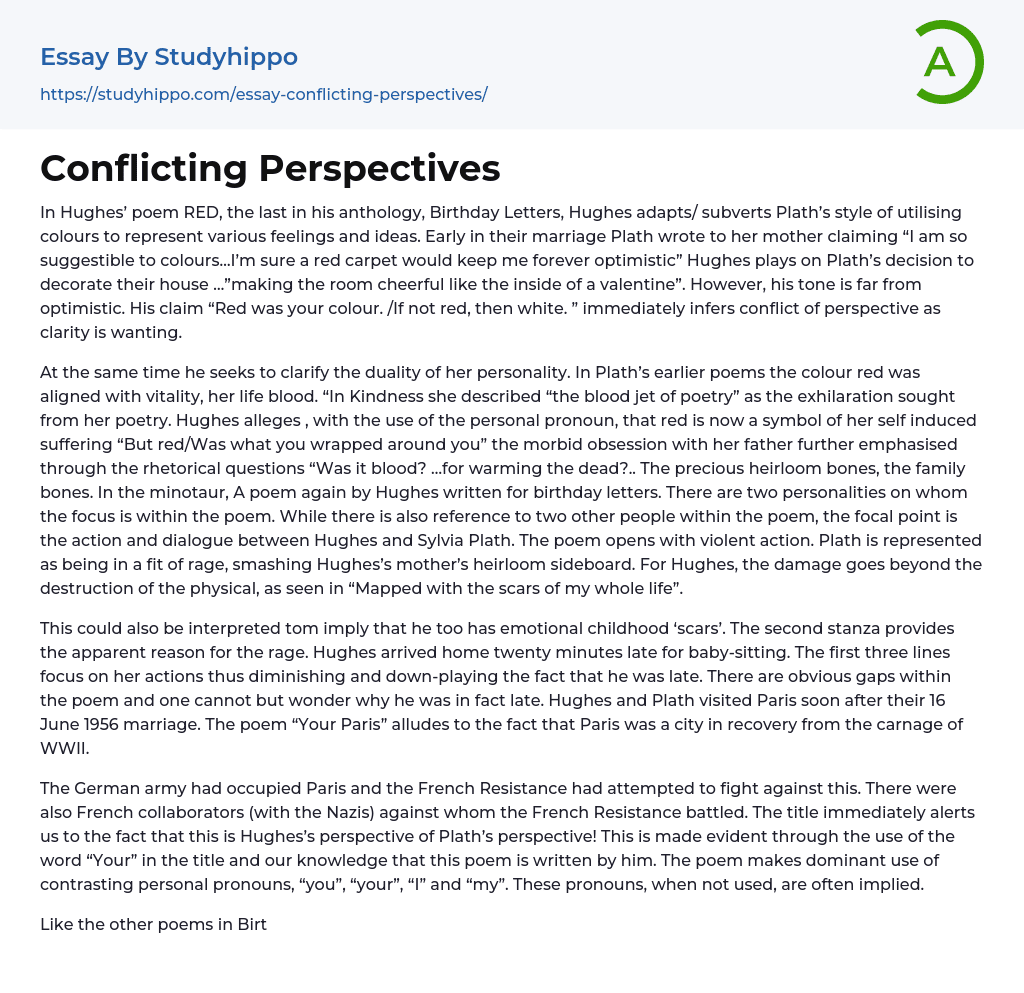At the same time he seeks to clarify the duality of her personality. In Plath’s earlier poems the colour red was aligned with vitality, her life blood. “In Kindness she described “the blood jet of poetry
...” as the exhilaration sought from her poetry. Hughes alleges , with the use of the personal pronoun, that red is now a symbol of her self induced suffering “But red/Was what you wrapped around you” the morbid obsession with her father further emphasised through the rhetorical questions “Was it blood? …for warming the dead?.. The precious heirloom bones, the family bones. In the minotaur, A poem again by Hughes written for birthday letters. There are two personalities on whom the focus is within the poem. While there is also reference to two other people within the poem, the focal point is the action and dialogue between Hughes and Sylvia Plath. The poem opens with violent action. Plath is represented as being in a fit of rage, smashing Hughes’s mother’s heirloom sideboard. For Hughes, the damage goes beyond the destruction of the physical,
as seen in “Mapped with the scars of my whole life”.
This could also be interpreted tom imply that he too has emotional childhood ‘scars’. The second stanza provides the apparent reason for the rage. Hughes arrived home twenty minutes late for baby-sitting. The first three lines focus on her actions thus diminishing and down-playing the fact that he was late. There are obvious gaps within the poem and one cannot but wonder why he was in fact late. Hughes and Plath visited Paris soon after their 16 June 1956 marriage. The poem “Your Paris” alludes to the fact that Paris was a city in recovery from the carnage of WWII.
The German army had occupied Paris and the French Resistance had attempted to fight against this. There were also French collaborators (with the Nazis) against whom the French Resistance battled. The title immediately alerts us to the fact that this is Hughes’s perspective of Plath’s perspective! This is made evident through the use of the word “Your” in the title and our knowledge that this poem is written by him. The poem makes dominant use of contrasting personal pronouns, “you”, “your”, “I” and “my”. These pronouns, when not used, are often implied.
Like the other poems in Birthday Letters, “Your Paris” is written with the benefit of hindsight as well as the advantage of an intimate knowledge of Plath’s Ariel anthology. The Poem Daddy, My related material, Written by Plath. This poem conveys tension from the very outset. It is a confessional poem, in which Plath reveals a love-hate relationship for both her father and Ted Hughes, her husband. The title “Daddy” has positive connotations associated with
love, warmth and security. This is sharply contrasted with the first line “You do not do, you do not do”.
The tone can be interpreted as insistent because of the repetition but it is also possible to view it as accusatory because of the repetition of the work “not”. When you consider that Plath has used enjambment here, then the opening line must be read to include the first two words of the second line, “Any more”. This then brings us to the idea that ‘daddy’ is no longer active, hence no longer alive. The speaker then establishes the image of the black shoe. Black is a colour used frequently in this poem and each time the connotations are negative.
Plath uses colour to great effect within this poem, “black, white, green, blue, bright blue” and red is implied through the idea of blood. This poem is the first in a chronological selection from Birthday Letters by Ted Hughes. It is a representation of his first sighting of the other person addressed in the poem. It explores the poet’s first sighting of Sylvia Plath in a photograph on a newspaper stand at the Strand. While walking on a hot summer’s day, the speaker passes a news stand displaying the newspaper of the day. He notices the picture of the Fulbright Scholars who were the intake for that year.
The assumption in this poem is that Sylvia Plath was one of the students represented in that photograph. The poem explores Hughes’s memories and reminiscence about that day. In the poem the speaker draws on both memory and hindsight. This creates a tension within the poem, between what he remembers
and what he has since learned. For this reason there are conflicting perspectives within this poem. However, one must remember that the poem is merely HIS perspective, his interpretation, his perception of the events of that day and consequently – as inferred within the poem-of their lives together. For this reason it is subjective.
- Book Summary essays
- Metaphor essays
- Reader essays
- Rhyme essays
- Literary devices essays
- Villain essays
- Books essays
- Genre essays
- Literary Criticism essays
- Writer essays
- Protagonist essays
- Simile essays
- Poem essays
- Book Report essays
- Book Review essays
- Greek Mythology essays
- Plot essays
- Tragic Hero essays
- Coming of Age essays
- Play essays
- Rhetoric essays
- Rhetorical Question essays
- Translation essays
- Understanding essays
- Reason essays
- Character essays
- Letter essays
- American Literature essays
- Literature Review essays
- Utopia essays
- Poetry Analysis essays
- Dante's Inferno essays
- Between The World and Me essays
- Incidents in The Life of a Slave Girl essays
- Flowers for Algernon essays
- Myth essays
- Everyday Use essays
- Boo Radley essays
- Genesis essays
- Richard iii essays
- Alice in Wonderland essays
- On the road essays
- Ozymandias essays
- The Nightingale essays
- Holden Caulfield essays
- Animal Farm essays
- 1984 essays
- A Hanging essays
- Shooting An Elephant essays
- A Tale Of Two Cities essays




